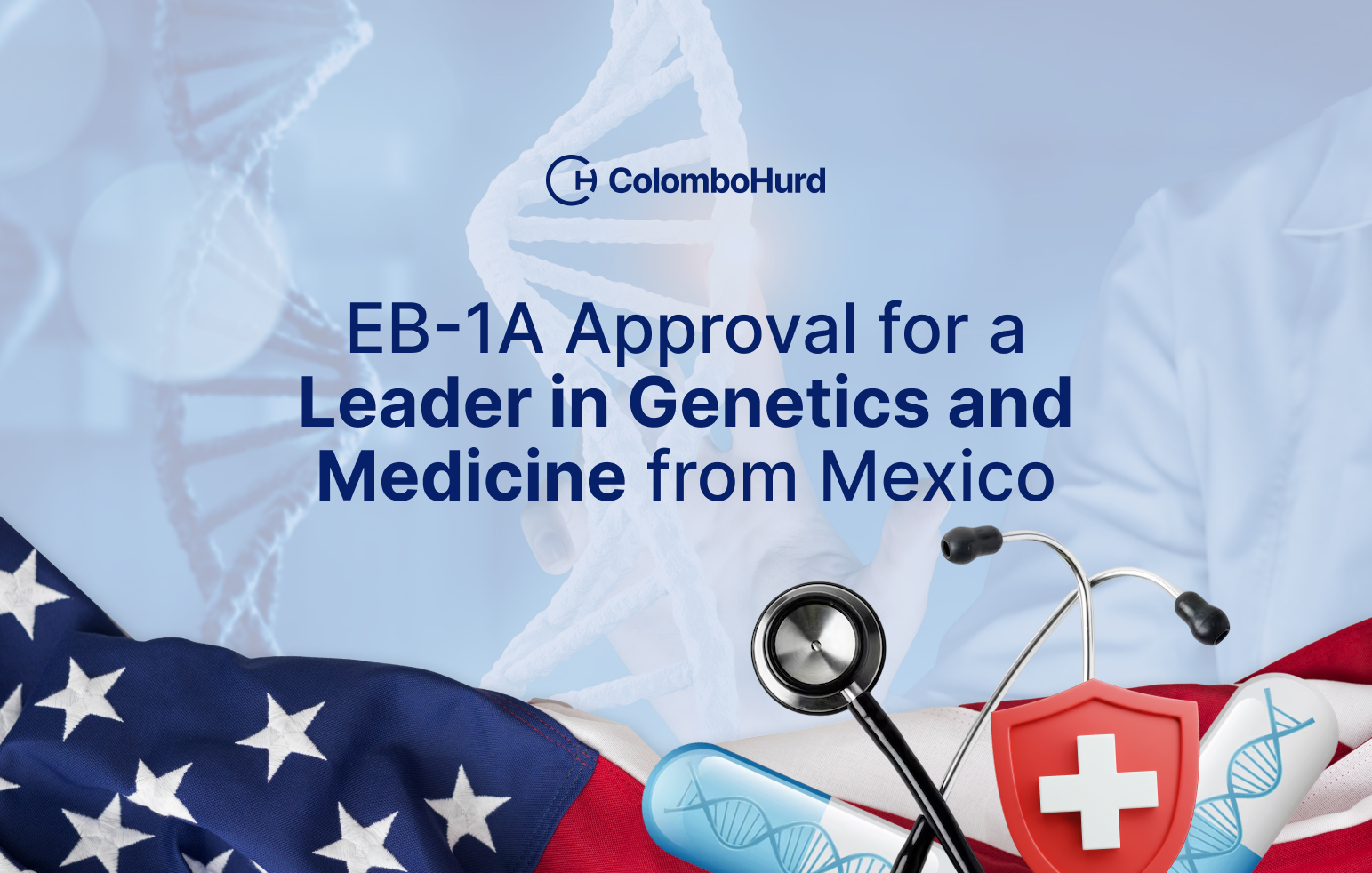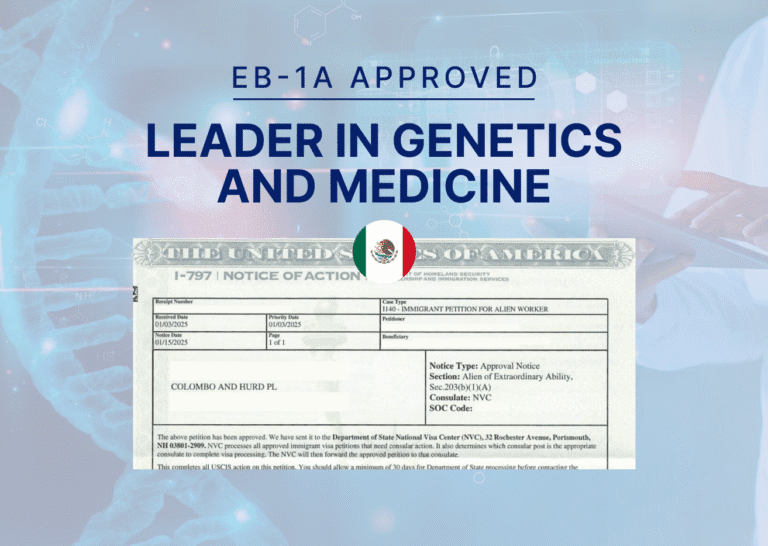Genomic researcher
Genomics, the study of the complete set of DNA instructions, is transforming medicine by enabling earlier disease detection and personalized treatments. It offers new hope to more than 300 million people worldwide living with rare genetic disorders.
For our client, a Mexican physician-scientist and pioneer in genomic research, this work is more than scientific discovery: it is a lifelong mission to make advanced medical knowledge accessible to society.
USCIS approved his EB-1A petition, recognizing his extraordinary ability and global contributions. Colombo & Hurd Attorney Rachel Slomski led the strategy for this case, guiding the petition from preparation through approval.

Advancing Genomics
With more than 25 years of experience, our client has built an international career at the intersection of medicine, genomics, and public health. He began his professional path in clinical medicine and later transitioned into research to explore how genetic analysis could improve diagnosis and treatment.
Over time, his work moved beyond the lab. In fact, he helped establish a national institute for genomic medicine in Mexico, one of the most significant scientific institutions in Latin America. His leadership helped establish genomic research as a national priority and opened doors for collaboration between scientists, clinicians, and policymakers.
In addition to his work in Mexico, he has served as a professor and director at a U.S. public health university, where he leads projects focused on genetic diversity and disease prevention. His academic contributions include over 90 peer-reviewed publications, widely cited by researchers around the world. He has also organized international conferences, mentored scientific teams, and led initiatives that connect genomic discoveries to real solutions in healthcare.
Attorney Rachel Slomski, who led his EB-1A strategy at Colombo & Hurd, explained the strength of his profile: “With EB-1A, we need to demonstrate that the petitioner has sustained recognition through national or international acclaim. In this case, we had strong evidence—articles in high-impact journals, research adopted by peers, and recognition from governments and universities. He not only contributed to mapping the human genome but also advanced personalized medicine as an entrepreneur, bridging academia with real-world application.”
Overall, his career reflects scientific credibility, long-term impact, and a clear record of international recognition, all essential elements in a successful EB-1A petition.
Crafting a Cohesive Narrative from Extensive Achievements
Unlike many EB-1A petitions that focus on meeting a few required elements, this case involved a large volume of high-level evidence. The challenge was not a lack of accomplishments; in fact, his profile exceeded EB-1A standards in multiple categories. Instead, the challenge was presenting his work in a way that was clear, compelling, and easy for USCIS to evaluate.
With such an extensive record, publications, citations, leadership roles, national influence, academic recognition, and global collaboration, there was a risk of overwhelming the reviewing officer. The key was to organize the evidence into a persuasive narrative rather than a document-heavy legal presentation.
As Attorney Rachel Slomski explained, the key was not simply presenting everything but carefully curating the strongest elements of his record: “With such a broad record of achievements, we need to prioritize the most impactful evidence. It is quality over quantity; we don’t want to overwhelm a reviewing officer with hundreds of pages when we can highlight the most compelling accomplishments.”
See if you qualify
Get your free EB-1A visa profile evaluation today.
Framing a Career of Research, Leadership, and Innovation into a Compelling EB-1A Case
Colombo & Hurd designed a petition strategy focused on clarity, relevance, and impact. Instead of submitting hundreds of disconnected documents, the legal team built a structured presentation around three themes that best represented his career:
- Scientific contribution through advances in genomic research
- Leadership in building scientific institutions and research programs
- Real-world application of genomics in public health and biotechnology
Organizing the petition around these themes allowed us to tell a clear story rather than simply presenting a long list of accomplishments. This approach made the petition easy to follow and focused on what mattered most, evidence of real influence and long-term recognition.
Rather than submitting excessive documentation, the legal team selected only the most persuasive materials, such as influential publications, citation records, institutional leadership, and international recognition. By emphasizing quality over volume, the petition highlighted his extraordinary ability clearly and efficiently.
EB-1A Approval Secured for a Mexican Leader in Genomics
USCIS approved the client’s EB-1A petition. The approval confirmed that his record demonstrated extraordinary ability and sustained international recognition in the field of genomics and scientific research.
Because the petition was presented with a clear strategy and strong supporting evidence, the case moved efficiently through review. The approval allows our client to continue his work in the United States, where he plans to expand research on genetic diversity, develop new public health genomics initiatives, and support biotechnology projects with long-term medical impact.
This result reflects not only his scientific achievements but also the value of presenting a well-structured petition that tells a meaningful professional story.
If you’d like to explore whether an EB-1A could support your own vision, we offer a free evaluation here.
As Attorney Rachel Slomski emphasized, the EB-1A standard recognizes both extraordinary ability and the commitment to continue contributing in the U.S.:
“We focus not only on extraordinary ability and sustained recognition, but also on how the client will continue benefiting the United States. This approval allows him to expand his scholarly work while also leveraging his entrepreneurial side to advance personalized medicine and public health innovation.”


